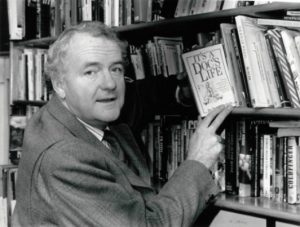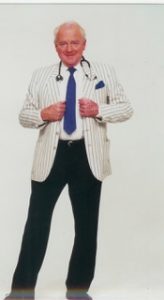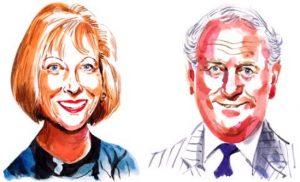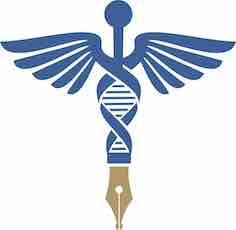It is with great sadness that I am reporting the death of David Delvin, 79.
I knew David as a colleague when he was medical editor at GP and I was editor; as a fellow member for some 30 years or more of the MJA Executive Committee; as a friend; as a man who made a historic contribution to medical journalism which freed up communication between medicine and the media, and finally, as a gentleman.
He was also one of the few doctors, perhaps the only one, to have been both the subject of a GMC complaint and a member of its Council.
The soft, gentle tone with which we were all familiar was at odds with the sharp edge and crusading zeal that characterised his GMC persona in his long fight over the Council’s links with South Africa. The GMC, he declared, was a reactionary, racist organisation “which tended to put the thumbscrews on Asian doctors who could not hit back”. Yes, gentle David didn’t mince his words.
I met last week a charming Oxford academic and historian, Dr Sally Frampton, who is compiling a proposal about the history of medical journalism in the second half of the 20th century. I told her that David was/is one of the most important people in the story. Although most of them don’t realise it, every medical practitioner who writes or talks to the media today is in David’s debt.
He began his media career as a newly qualified doctor in the 1960s when any doctor writing for publication risked exposing themselves to GMC scrutiny for ‘self-advertising’. Most doctors were justifiably afraid about either talking to journalists or writing for newspapers or magazines.
But David was a rebel reflecting the values of the swinging sixties – the revolt symbolised by The Rolling Stones, The Beatles, student uprising, the Civil Rights movement, CND, the Vietnam War movement, women’s liberation and the advent of the contraceptive pill, a driver of the sexual revolution. Nothing, it seemed, was sacred any more.
David was adamant that doctors should not be compelled to write under the cloak of pseudonyms, but was understandably alarmed when the GMC informed him, in 1974, that a complaint had been laid against him, alleging self-advertisement. He was at risk of being struck off.
Widely supported by medical colleagues, medical journalists and a wide range of newspapers and journals, he insisted that that he had done nothing wrong. The ‘offending’ articles included a series commended in the Medical Journalists’ Association awards.
The complaint was dropped within 50 days. Tony Thistlethwaite, the author of In Independent and Bloody Minded: the story of the MJA:1967-97, said: “The GMC showed common sense, but it was seven weeks of hell for David.”
Five years after being cleared by the GMC David himself joined the Council, partly fired, he later admitted, by a desire ‘to show the buggers’. He did just that, with style and commitment. Already well-versed in controversy and bucking the establishment, he had been a founder member of the Action Group of Junior Hospital Staff campaigning for better and conditions for junior doctors.
Born in 1939 London to an Irish mother and Scots father, he trained at King’s College after losing his mother at the age of 17. Her death influenced his decision to go into medicine. Qualifying in 1962 he worked at King’s College and in Brighton.
He married his first wife, Kathy, in 1966. They had three children. Immediately after marriage he worked for the Ministry of Overseas Development in Jamaica. He loved the country and its people and in 1967 began writing a weekly medical column in the famous Daily Gleaner. This continued for 50 years — perhaps a world record — until, in 2017, he became too ill to carry on.
Returning to the UK he combined general practice, sexual health and family planning with medical journalism, with a heavy emphasis on sex. He said: “It was apparent at medical school that most patients knew little about sex. Nor did many doctors. Medical students had no teaching at all about it, except one lecture on the cap, and one on abortion, infanticide and rape.” Sexual medicine attracted him, he said, because ‘you could put things right’.
After working with the Family Planning Association and the Institute of Psychosexual Medicine, he became a founding fellow of the Faculty of Family Planning of the Royal College of Obstetricians and Gynaecologists. He appeared on 930 TV programmes and wrote 34 books, including The Book of Love which sold more than a million copies and became a family planning textbook.
Translated into more than ten languages as well as Braille, it won the American Medical Writers’ Association ‘Best Book’ award. He was bewildered to receive a medal (Médaille de la Ville de Paris) from former French president and prime minister Jacques Chirac.
But the heady blend of medicine, sex and journalism nearly finished him. The man who became the ‘Dr Bright and Breezy’ of sex education began writing professionally after a few paragraphs in The Guardian netted more than a week’s houseman’s salary. It was probably significant that The Book of Love, with its graphic images, was first published in 1974, the year of his GMC ordeal.
The book was a catalyst for videos such as The Lover’s Guide and TV programmes including The Good Sex Guide, the general tone of which was summed up in a sequence in a Solihull snooker club. Men were seen playing a ‘stick on the tail of the donkey’ game to find out if they knew where the clitoris was. (Half did.)
The language of Delvinese was similarly controversial. Witness his “Positions of the month” in She magazine simultaneously proclaimed as “naff” and “brilliant”.
Of “The Lean Back” or “Grenoble,” he wrote: “Some say that this is named after the town in the French Alps where you have to lie pretty far back to get a view of the mountain tops…it’s dead easy really. You begin by sitting astride him (facing him). Next, gently put him inside you — and then lean very slowly backwards till your head is on the bed, in the region of his feet. Conversation will not be easy now unless, of course, you ring him up on your cordless phone.”
Of Le Bergerac (nearly sideways on) he wrote: “Some folk say that’s named after the hero of the BBC TV series of the same name. Others claim that it has something to do with the sun-filled and agreeable Vin de Bergerac. Still others maintain that the position was the most favoured by Cyrano de Bergerac (he of the extremely long nose). All wrong, I’m afraid. I made the name up. “
He counted among his career highlights his tenure as the columnist Dr Jekyll in World Medicine, edited by the powerful Michael O’Donnell, one of his staunchest allies in his stand against the GMC. As the broadcaster and fellow MJA committee member Geoff Watts reported, Dr Jekyll took a bawdy delight in showing that the magazine’s highly qualified and intellectually gifted readership had a taste for salacious knockabout humour.
In 1988 David married fellow writer and TV presenter Christine Webber whom he met at Anglia TV. They collaborated on many books and journalistic and broadcasting projects. A She magazine profile in the 1980s noted that “Christine and Doc D always make a point of changing for dinner, however late in the day”. Dinner, she was reported as saying, was “such a romantic way to end the day”.
Christine tells me they continued changing for dinner until he was too ill to do so. It was their way of injecting romance into their lives. “We get many letters from women,” he added, “ whose partners have forgotten all about romance and who want a good bonk without any preliminaries.” He warned that many relationships fell apart because couples claimed that they hadn’t got time for romance.”
Just by way of something completely different, one of David’s major preoccupation while he was MJA chair and a longstanding committee was the constitution. It was as if he were its guardian. Just as generations of doctors are indebted to him, so are we. There will never be another quite like him. David was diagnosed with cancer 15 months ago. He is survived by three children and seven grandchildren.
Private family funeral. Christine is planning to celebrate David’s life at the Royal Society of Medicine in the summer.






Fantastic John; a worthy tribute by one good writer of another. Your obit captures the essence of David as many of us knew him: the soft-voice delivering the sharp barb; the talent for iconoclasm and for mischief. A generation of media-medics and medical journalists owe him a tribute, and you have declared it. As you say a historic and a pivotable role in the evolution of medical writing.
John Illman’s portrayal of David is spot on. In the pre-journalistic days of my brief academic career I became an avid reader of World Medicine including, of course, its two regular and contrasting columns, Dr Jekyll and, yes, Mr Hyde. The latter, written by the also departed Paul Vaughan, was an acerbic affair, full of Paul’s dry wit and clever, scornful put downs – quite unlike what John rightly describes as Dr Jekyll’s “salacious knockabout humour”. One consequence of my regularly scanning of the Jekyll column was to form a mental picture of its author: probably a loud mouth anti-intellectual whose natural home was the saloon bar, whose only conversation would be smutty jokes, and whose reading would seldom stray beyond the sports pages. Someone, perhaps, resembling the great Barry Humphries creation, Sir Les Patterson.
In due course I was lucky enough to be hired by Michael O’Donnell and joined the staff of World Medicine as its science editor. And, again in due course, I met Dr David Delvin, the author, so I was told, of this fortnightly page of low humour. Softly-spoken, kindly, diffident, self-effacing…could this be the man behind the Patterson figure of my imagination? It could and it was. To this day I still can’t quite relate the one to the other. Well done, David. You and your typewriter (as it was in those days) had me completely taken in.
Geoff Watts
I would like to add to the excellent obituary and comments about David. He was warm and charming, but kept you at arm’s length; he was urbane and the person you would most like to be your GP, but he was a private man, to me, and his manner made you wary of over-stepping the mark.
When I was features editor at GP in the early 80s and David was medical editor, we were discussing an article on medical etiquette. “How do you deal with people seeking your advice at parties?” I asked. “I ask them to undress so I can examine them there and then. It usually does the trick,” he replied.
Olivia Timbs
My last words to David were a couple of years back when he mentioned his knees were playing up. Having the occasional problem in that part of the anatomy myself, I said: “Yes, knees are buggers.” David replied in typical style; “That’s a pretty accurate clinical description.” A great guy.
Peter Pallot
Great obit John. David was always the most charming man. When I first joined the MJA he went out of his way to be helpful and friendly and he chaired the organisation with authority and kindness. He will be much missed.
It is so sad to hear that David has gone. As John Illman has indicated, David served a very long term on the MJA executive. Probably the longest of all of us. Month in month out, there he was as helpful and smiling as ever.
David was one of those people who managed not to have an ill word for others — a fine example.
He was good at the difficult leadership roles but he was never too grand to help with the mundane.
As John has indicated, David did good work helping to keep the Association’s constitution in order. And this entailed entering the hornet’s nest of journalists‘ relationships with public relations staff. A topic that has exercised the MJA since it was founded. Today, partly as a result of David’s efforts there seems to be a healthy symbiosis within the Association between the two sides.
I first encountered David in his role as medical editor of GP. I was a young Science Editor of GP with much to learn. And he was in the office every week supporting our efforts to publish interesting and accurate clinical features for GPs. I found him a first class mentor and good work colleague.
I remember the wonderful humour of World Medicine and David’s efforts to expose medical quackery in the pages of World Medicine.
That engaging smile and friendly approach will be much missed.
I so appreciated David’s kindness and wisdom when I started out as a journalist at GP in the mid 70s. He came in once or twice a week and I’d save up all my medical queries which he’d answer with endless patience. He was so generous with his knowledge and time – far better than Google, and always with a smile. Decades later, I interviewed him for a landmark drug article about the Pill. He was just the same – full of useful information and great anecdotes – and as happy as ever to help another journalist.
I didn’t meet David Delvin so much as inherit him. When I became editor of World Medicine in 1966 he was already on the magazine’s masthead described, I kid you not, as ‘Our Jamaican Correspondent’.
I had a romantic vision of a freckle-faced beachcomber, great-grandson of the notorious Irish adventurer Captain Michael Patrick Ignatius Devlin who, after a lifetime of piracy in the Caribbean, settled in Montego Bay and took to the rum with such assiduity that he found it easier to articulate his surname as Delvin.
I was a mite disappointed when I met David on his return to England and discovered he was, to use a typical Delvin phrase, ‘a decent sort of a bloke’, indeed a proper doctor who’d been to a proper medical school – well, King’s College Hospital – and had probably combed a beach as often as my ten year-old son combed his hair.
By then we had started a diary column in World Medicine headed with a Victorian woodcut of an over-benevolent, moustachioed man whom we named Dr Jekyll. For the first few years the content was compiled in the office and was a bit dreary. I decided that the problem was that it had no identity. So, in 1973, I invited our erstwhile Jamaican Correspondent to take it over and, for the next nine years watched him develop the character portrayed in the woodcut.
As Geoff Watts discovered, old Jekyll was the antithesis of David’s own character yet he made him so convincing that when some paranoid buffoon tried to get David done over by the GMC for writing under his own name in the public prints, we commissioned a cover picture not of Delvin but of Jekyll peeping nervously over the rim of the dock at the GMC tribunal in Hallam Street. The ridicule that followed helped persuade the GMC to drop the case.
Four years later, when a new Medical Act allowed more doctors to be elected to the GMC, David stood in the election, won, and joined a tiny band of rebels in the skirmishes we had to fight to reform that doleful body. His presence, as you would expect, worked wonders for our morale.
Over the past ten years, while my activities have been increasingly hobbled by the multi-morbidity that comes with age, David became a pen pal. I began to receive occasional emails or postcards triggered by something he’d read, or heard, or done… or just because he wanted to say hello. It was characteristic Delvin behaviour and I’m glad I was able to tell him how much I enjoyed hearing from him.
David and I used to tease one another about the the influence our Celtic heritage might be having on our lives. In the South West of Ireland, where all my genetic material comes from, the highest accolade a person can bestow upon another is that ‘he is a dacent man’ or ‘she is a dacent woman’. I realise now that David was, above all, a “dacent man” and that is the memory that will endure with me. A kind, decent, gentle man
So lovely to read this comment, Michael. David really loved and admired you, all his life.
Further to these lovely comments, I’d like to thank all the MJA members who turned up at the evening I held at the RSM in memory of David. Some pictures here if you want to see them: https://christinewebber.com/dr-david-delvin/